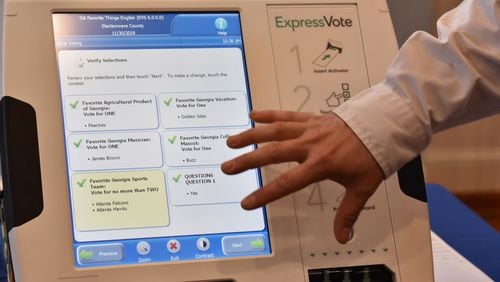We'll have more on this as the day progresses, but a situation is developing that could put Democrats in the state Legislature between a rock and a hard place.
At 3 p.m. in Room 406 of the Coverdell Legislative Office Building, a subcommittee of the House Governmental Affairs Committee will take up HB 316, perhaps the most important measure of the winter session.
We’re told that the two-hour hearing will be the only opportunity for public testimony on the House side.
The chief purpose of the bill, authored by state Rep. Barry Fleming, R-Harlem, is to authorize the $150 million for the purchase of voting machines (and training) that will be used in all 159 counties. As outlined in the measure, the legal description of these machines fits a Republican-favored touch-screen system that prints receipts after ballots are cast.
Many Democrats prefer a system in which voters would cast ballots by hand.
But this is not a universal position. Some have quietly argued that a touchscreen system would be easier for the disabled and elderly to navigate.
But that’s not all that HB 316 would do. It also contains fixes – still being vetted by distrustful Democrats – for many issues raised during the 2018 race for governor. For instance, the bill establishes a clearer protocol for signature matches that, last year, resulted in an inordinate number of absentee ballots being disallowed.
Counties would be required to give quicker notice if they choose to close or shift voting precincts, and give justification. These and other provisions can be considered sweeteners to peel off Democratic votes.
But this afternoon’s climate could be hostile to any diplomatic outreach. Early this morning, Stacey Abrams’ Fair Fight organization sent out an email to supporters urging them to pack this afternoon’s meeting – and demand paper ballots. From the email:
The bill makes a lot of changes that won't stop the cycle of suppression and in fact could make it even worse – we'll still see mass purging and hours-long lines, along with other major problems…
This bad, rushed bill is no surprise, as the bill's main sponsor is Representative Barry Fleming, the man who sponsored a bill to reduce early voting days, supported sending police officers to homes of black residents to challenge their voter registration, and authored the 2017 "exact-match" bill.
Democrats on the subcommittee will led by House Minority Leader Bob Trammell of Luthersville. His will be the voice to watch.
***
Separately, Democrat Stacey Abrams will be one of the chief witnesses this morning at a U.S. House subcommittee hearing on voter suppression. The hearing begins at 9:30 a.m. at the Carter Center. Click here to watch via livestream.
***
Atlanta isn't the only place in the South where elections will be under scrutiny today. From the Associated Press:
The country's last undecided congressional election was marred by falsified signatures, disappearing documents and blank ballots that were filled in by people hired by the Republican candidate, North Carolina elections officials said.
The state elections board could decide as early as Tuesday whether possibly criminal ballot fraud was unfortunate but tolerable, or whether to order a new election in the 9th congressional district.
A political operative hired by Republican Mark Harris led "a coordinated, unlawful and substantially resourced absentee ballot scheme" in last year's general election in rural Bladen and Robeson counties, which are part of the congressional district, state elections director Kim Strach said Monday.
***
Presidential contenders are already beating a path to Georgia to start earning votes for next year's primary. What's not certain yet is when that vote will be held.
Georgia is one of a handful of states that has yet to set a date for the 2020 presidential primary, according to the elections law FrontloadingHQ site.
Prior to the last presidential cycle, state lawmakers gave the secretary of state the power to decide the date of the presidential primary, but newly elected Brad Raffensperger has yet to address the issue. His staff isn’t ready to talk about it, either.
It's presumed that Georgia will hold the 2020 primary on March 3, joining California, Texas, Massachusetts and a bloc of southern states that has already picked that date.
And Gov. Brian Kemp, who helped orchestrate a similar pairing of votes in 2016, has expressed support for another "SEC primary" next year.
Raffensperger, who eked into office with a runoff win, is likely to follow Kemp’s lead. But until he makes his move, the timing of the vote is in limbo.
***
Gov. Brian Kemp swore in a new slate of state officers at the Capitol on Monday. Here's the list:
-- Rachel Davidson, the new director of the Office of the Child Advocate, was previously the interim director;
-- Allen Poole, the new director of the Governor’s Office of Highway Safety, was previously chair of the Haralson County Commission;
-- Tom Rawlings, the new director of the Division of Family and Children Services, was previously the interim director;
-- Vic Reynolds, the new GBI director, was previously the Cobb County district attorney;
-- Kirk Shook, the new head of the Georgia Nonpublic Postsecondary Education Commission, was previously a teacher;
-- Timothy Ward, the new commissioner of the Department of Corrections, was previously the interim commissioner.
***
The local Republican response to President Trump's national emergency declaration is generally falling into three camps: reluctant acceptance, silence or "we'll get back to you."
Most of the state’s most conservative U.S. House members are falling into the former category, including Doug Collins, Tom Graves and Jody Hice. They represent safe congressional seats in districts that Trump comfortably won in 2016, and most of their responses have fallen along the lines of “we wish Trump didn’t have to do this, but he has every right to.” Case in point, Buddy Carter, R-Pooler: “Democrat's refusal to negotiate in good faith has left President Trump no other option than to take action on his own for the security of Americans.”
Notable lawmakers we haven’t heard from include U.S. Rep. Rick Allen of Augusta, whose district is home to Fort Gordon, home to construction projects with budgets Trump could divert.
The offices of Georgia's two GOP senators, Johnny Isakson and David Perdue, say they're waiting to hear more detail from the White House before weighing in definitively. When the issue first came up last month, Perdue seemed more open to backing the declaration than Isakson, who was wary about giving the executive branch unchecked power.
Democrats, meanwhile, are universally opposed to Trump's move. They're seeking to put Republican lawmakers in an awkward spot by forcing votes on a resolution of disapproval in the weeks ahead.










